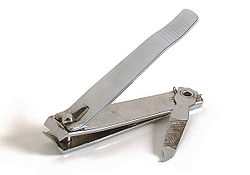Compound Lever: Difference between revisions
From DT Online
mNo edit summary |
m (Added image) |
||
| Line 1: | Line 1: | ||
[[File:BenchShearCompoundLever.jpg|400px|right]] | [[File:BenchShearCompoundLever.jpg|400px|right]] | ||
Levers of any of the 3 Classes may be combined such that the load of one lever is the effort applied to another | Levers of any of the 3 Classes may be combined such that the load of one lever is the effort applied to another. | ||
Common examples of '''Compound Lever''' applications include: bolt cutters, [[Bench Shears and Guillotines|bench shears]], 'aviation' type [[tinsnips]], bass drum pedal and mechanical typewriter mechanisms. | |||
This can be done to increase '''[[Mechanical Advantage]]''' ''(especially where operating space is restricted)'' or to increase movement as with a piano key mechanism for example. | |||
[[File:Fingernail Clippers.jpg|250px|left]] | |||
Common examples of '''Compound Lever''' applications include: nail clippers, bolt cutters, [[Bench Shears and Guillotines|bench shears]], 'aviation' type [[tinsnips]], bass drum pedal and mechanical typewriter mechanisms. | |||
Revision as of 08:39, 2 June 2015
Levers of any of the 3 Classes may be combined such that the load of one lever is the effort applied to another.
This can be done to increase Mechanical Advantage (especially where operating space is restricted) or to increase movement as with a piano key mechanism for example.
Common examples of Compound Lever applications include: nail clippers, bolt cutters, bench shears, 'aviation' type tinsnips, bass drum pedal and mechanical typewriter mechanisms.

